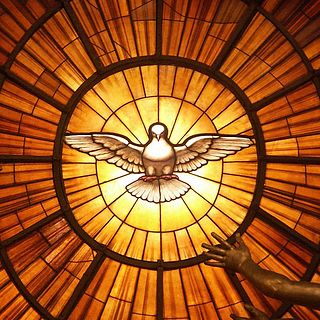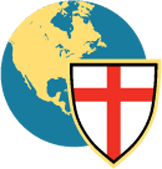
The Eastern Orthodox Church, also called the Orthodox Church, Greek Orthodox Church, or officially the Orthodox Catholic Church, is the second-largest Christian church, with approximately 220 million baptised members. It operates as a communion of autocephalous churches, each governed by its bishops via local synods. The church has no central doctrinal or governmental authority analogous to the head of the Catholic Church. Nevertheless, the Ecumenical Patriarch of Constantinople is recognised by them as primus inter pares, a title formerly given to the patriarch of Rome. As one of the oldest surviving religious institutions in the world, the Eastern Orthodox Church has played a prominent role in the history and culture of Western Asia, the Caucasus, and Eastern and Southeastern Europe.
The Eastern Orthodox Church, officially the Orthodox Catholic Church, is a communion composed of up to seventeen separate autocephalous (self-governing) hierarchical churches that profess Eastern Orthodoxy and recognise each other as canonical (regular) Eastern Orthodox Christian churches.
The Continuing Anglican movement, also known as the Anglican Continuum, encompasses a number of Christian churches, principally based in North America, that have an Anglican identity and tradition but are not part of the Anglican Communion.
The charismatic movement in Christianity is a movement within established or mainstream Christian denominations to adopt beliefs and practices of Charismatic Christianity with an emphasis on baptism with the Holy Spirit, and the use of spiritual gifts (charismata). It has affected most denominations in the US, and has spread widely across the world.

The Catholic Charismatic Renewal (CCR) is a movement within the Catholic Church that is part of the wider charismatic movement across historic Christian churches.
Christian liturgy is a pattern for worship used by a Christian congregation or denomination on a regular basis. The term liturgy comes from Greek and means "public work". Within Christianity, liturgies descending from the same region, denomination, or culture are described as ritual families.
Paleo-orthodoxy is a Protestant Christian theological movement in the United States which emerged in the late 20th and early 21st centuries and which focuses on the consensual understanding of the faith among the ecumenical councils and Church Fathers. While it understands this consensus of the Church Fathers as orthodoxy proper, it calls itself paleo-orthodoxy to distinguish itself from neo-orthodoxy, a movement that was influential among Protestant churches in the mid-20th century.

In Christianity, worship is the act of attributing reverent honour and homage to God. In the New Testament, various words are used to refer to the term worship. One is proskuneo which means to bow down to God or kings.

The Autocephalous Orthodox Church of Albania, commonly known as the Albanian Orthodox Church or the Orthodox Church of Albania, is an autocephalous Eastern Orthodox church. It declared its autocephaly in 1922 through its Congress of 1922, and gained recognition from the Patriarch of Constantinople in 1937.
The Traditional Anglican Church (TAC), formerly the Traditional Anglican Communion, is an international church consisting of national provinces in the continuing Anglican movement, independent of the Anglican Communion and the Archbishop of Canterbury. The TAC upholds the theological doctrines of the Affirmation of St. Louis. Each of the respective jurisdictions utilizes a traditional Book of Common Prayer deemed to be free of theological deviation. Most parishioners of these churches would be described as being traditional Prayer Book Anglicans in their theology and liturgical practice. Some Anglo-Catholic parishes use the Anglican Missal in their liturgies. The TAC is governed by a college of bishops from across the church and headed by an elected primate.
The Charismatic Episcopal Church (CEC), officially the International Communion of the Charismatic Episcopal Church (ICCEC), is a Christian denomination established in 1992. The ICCEC is a part of the Convergence Movement. Within North America, most of the Charismatic Episcopal Church's congregations and missions are located within the Northern, Southeastern, Midwest, and Western United States; it also has a presence in Texas, and in Western Canada.
The Orthodox-Catholic Church of America (OCCA) is an independent and self-governing Christian syncretic jurisdiction based in the United States, with clergy also in Canada, Mexico, Brazil, Africa, and Australia.
The Convergence Movement, also known as the Ancient-Future Faith, whose foundation is primarily attributed to Robert E. Webber in 1985, is an ecumenical movement. Developed as an effort among evangelical, charismatic and Pentecostal, and liturgical Christians and denominations blending their forms of worship, the movement has been defined for its predominant use of the Anglican tradition's Book of Common Prayer; use from additional liturgical sources common to Lutheranism, Eastern Orthodoxy, and Catholicism have also been employed.
Western Rite Orthodoxy, also called Western Orthodoxy or the Orthodox Western Rite, are congregations within the Eastern Orthodox tradition which perform their liturgy in Western forms.
The Communion of Evangelical Episcopal Churches (CEEC) is a Christian convergence communion established in 1995 within the United States of America. With a large international presence in six provinces and seven U.S. dioceses, most of its churches and missions are spread throughout the Mid-Atlantic and Mid-West regions, and South Carolina; Florida and California; and India. The Communion of Evangelical Episcopal Churches is currently led by Bishop Quintin Moore as presiding bishop of the CEEC.

The Anglican Church in North America (ACNA) is a Christian denomination in the Anglican tradition in the United States and Canada. It also includes ten congregations in Mexico, two mission churches in Guatemala, and a missionary diocese in Cuba. Headquartered in Ambridge, Pennsylvania, the church reported 977 congregations and 124,999 members in 2022. The first archbishop of the ACNA was Robert Duncan, who was succeeded by Foley Beach in 2014.
The Ecumenical Catholic Church (ECC/ICE) is an Independent Catholic church established in Santa Ana, California by Mark Steven Shirilau and Jeffrey Michael Lau, in 1987. Adhering to conventional Latin Catholic Trinitarian theology and professing the Nicene Creed, the Ecumenical Catholic Church practices a liturgy similar to the Pauline Mass. Also considered an offshoot of the Brazilian Catholic Apostolic Church, the ECC differentiates from Roman Catholicism and independent Brazilian Catholicism through affirming and ordaining persons within the LGBTQ+ community.
The following outline is provided as an overview of and topical guide to the Catholic Church:
Protestant liturgy or Evangelical liturgy is a pattern for worship used by a Protestant congregation or denomination on a regular basis. The term liturgy comes from Greek and means "public work". Liturgy is especially important in the Historical Protestant churches, both mainline and evangelical, while Baptist, Pentecostal, and nondenominational churches tend to be very flexible and in some cases have no liturgy at all. It often but not exclusively occurs on Sunday.
Emilio Alvarez is a religious leader in the United States, and founding bishop of the Union of Charismatic Orthodox Churches. He is also the founding director of the Institute for Paleo-Orthodox Christian Studies.





